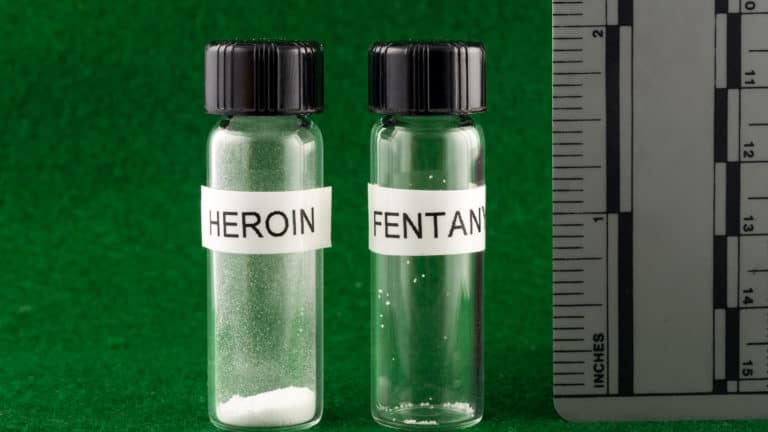Synthetic opioids such as fentanyl accounted for 31,000 deaths in 2018. Fentanyl is addictive and dangerous; however, fentanyl addiction treatment is within reach.
2020 marks 40 years in the making of the deadliest opioid, fentanyl. This synthetic opioid is similar to but stronger than its cousins heroin and morphine. Fentanyl is addictive and dangerous; however, fentanyl addiction treatment is within reach.
Are you dependent on or addicted to fentanyl? Begin your opioid addiction recovery today by calling Asheville Recovery Center at (828) 518-6996.
[elementor-template id=”29653″]
Fentanyl vs Heroin vs Morphine
Fentanyl, heroin, and morphine all fall into the same class of drugs: opioids. Heroin is a natural opioid meaning it is derived from a plant. Fentanyl and morphine are synthetic and semi-synthetic opioids meaning they are produced in a lab.
But what is the difference between these three opioids?
All three treat chronic pain, but fentanyl is misused more than the others. Fentanyl is a pharmaceutical drug mainly reserved for cancer patients that experience chronic pain or have developed a tolerance to weaker opioids.
For those with a prescription, fentanyl is most often administered via a patch on the skin. Fentanyl also comes in other forms such as an oral or nasal spray, lozenges or lollipops, and via injection.
Unfortunately, most fentanyl on the streets today is produced by illicit manufacturers and not pharmaceutical companies.
The feeling of euphoria is most sought in the misuse of opioids, but relaxation and reduced pain are also usually part of the high. However, also comes unpleasant side effects that affect the digestive system, heart, skin, and lungs. Confusion, hallucinations, and even seizures can occur.
Fentanyl compared to heroin doesn’t come easily to the naked eye or the wallet. In fact, heroin is often cut with fentanyl to stretch profit, or worse, fentanyl alone can be sold as “more potent heroin.”
Herein lies the dangers of fentanyl.
Why is fentanyl so deadly?
Fentanyl strengths have been measure in labs since its creation long ago. But, is fentanyl stronger than morphine? Is fentanyl stronger than heroin?
Fentanyl is stronger than both morphine and heroin. Heroin is two to five times stronger than morphine, but fentanyl’s strength is often 80-100 times higher than morphine.
This is why fentanyl is so deadly. As shown in the image above provided by the New Hampshire State Police Forensics Lab, a very small dose (3 milligrams) of fentanyl is lethal compared to a much larger dose (30 milligrams) of heroin that is lethal.
The numbers tell the story.
In 2018, the Center for Disease Control (CDC) reported 31,000 deaths as a result of the overuse of synthetic opioids such as fentanyl. These deaths account for 67% of all deaths involving any type of opioid use.
Sadly, many people overdose on fentanyl from the first use because dealers promote it as a more powerful dose of heroin when it often contains no heroin at all.
Is fentanyl addictive?
Fentanyl is extremely addictive because the withdrawal symptoms are so severe. Individuals who are prescribed or who misuse fentanyl can develop physical dependency very quickly.
The fentanyl withdrawal symptoms timeline is quite short. Within a few hours after a dose, the symptoms are similar to the flu with body aches, cold flashes, vomiting, diarrhea, and difficulty sleeping.
However, addiction is not the same as a physical dependency, though they often come hand in hand. Addiction to fentanyl, or any other substance, occurs when its use interferes with aspects of an individual’s life such as relationships, employment, school, and family obligations.
Other fentanyl addiction signs can include:
- Unintended prolonged use
- Increased tolerance over time
- A desire to stop or reduce use with little success
- Reduced participation in otherwise positive, quality activities
- Time, energy, and/or money is expended to obtain the next dose or recover from use
Don’t let fentanyl completely control your life or the life of a loved one. Dial (828) 518-6996 to speak with an Asheville Recovery Center representative to learn more about how we can help.
Fentanyl Withdrawal
Again, dependency and addiction occur because withdrawal from fentanyl is so unpleasant. The signs of fentanyl withdrawal are similar to flu symptoms but could also include:
- Blurred vision
- Irregular heartbeat
- Decrease in urine flow
- Confusion, nervousness, and mood changes
- Tingling, numbness, or swelling in hands and feet
How long does fentanyl withdrawal last?
The fentanyl withdrawal timeline can differ from person to person, but, generally, a fentanyl withdrawal lasts anywhere from 48 hours (the peak) to seven days. Though the fentanyl withdrawal symptoms duration is only a week in order to alleviate physical symptoms, mental and emotional symptoms can last for years.
In the following video, Alex Hogan with Stat interviews a former addict who provides a description of his fentanyl withdrawal and how it affects the body.
Going through fentanyl withdrawal cold turkey is extremely dangerous. If fentanyl use is suddenly ended, the functions of the lungs and heart can drop significantly which can lead to increased blood pressure, heart attack, or stroke.
Typically, fentanyl withdrawal symptoms treatment includes assistance from medications such as buprenorphine, naltrexone, or methadone at a medical fentanyl detox facility. Drugs such as these bind to the same brain receptors to reduce cravings and symptoms. Essentially, an individual is weaned off fentanyl with non-euphoric medications that trick the brain.
After fentanyl detox, an individual has the option to participate in a fentanyl rehab program.
Do you know someone who is in need of fentanyl treatment? Contact Asheville Recovery Center, one of the leading opiate rehab centers in North Carolina, to get more information about our fentanyl recovery program. Call (828) 518-6996.








